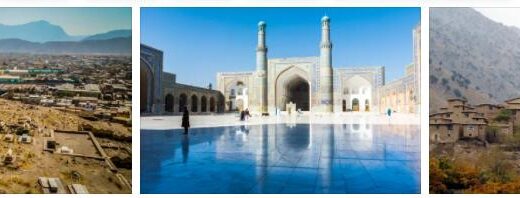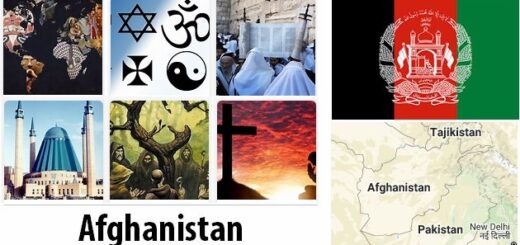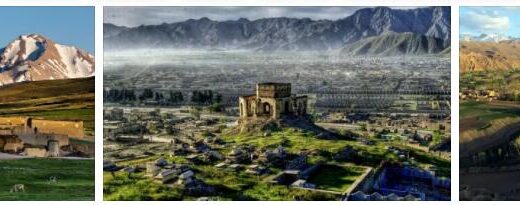State Structure and Political System of Afghanistan
Afghanistan is a unitary state with a republican form of government, which is at a transitional stage of political development. After the liquidation of the Islamic Emirate of Afghanistan in December 2001, the process of new state building began. The country temporarily, until the adoption of the new Constitution in January 2004, operated the liberal Constitution of 1964, with the exception of sections relating to the monarchy. Check equzhou for political system of Afghanistan.
In April 2003 a new Constitution was drafted. In December 2003, he entered the discussion and approval of the Constitutional Loya Jirga and, after signing by the President of the country, became the Basic Law of the State.
The text of the Constitution consists of 12 sections and 162 articles. It is based on the main provisions of the Constitution of 1964. The Constitution of Afghanistan proclaims an “Islamic republic” in which “national sovereignty belongs to the people” (Article 1). The religion of Afghanistan, the Constitution says, is “the sacred religion of Islam” (Article 2). Representatives of religious minorities are granted freedom of religion (Article 2). According to the Constitution, the supreme body of legislative power is the bicameral parliament, the highest body of executive power is the Cabinet of Ministers. The supreme executive and legislative power belongs to the President of the country.
Afghanistan consists of 32 provinces: Kabul, Parvan, Baglan, Kunduz, Takhar, Badakhshan, Samangan, Balkh, Jauzjan, Sari_Pul, Faryab, Badgis, Herat, Gur, Uruzgan, Zabol, Farah, Gilmand Nilmand,, Ghazni, Paktia, Paktika, Host, Kapisa, Logar, Vardak, Nangarhar, Lagman, Kunar, Nuristan. Each province is divided into districts (vulusvali), which consist of volosts (alakadari) respectively.
The largest cities: Kabul, Kandahar, Herat, Mazar-i-Sharif, Kunduz, Ghazni, Puli-Khumri, Jalalabad, Faizabad.
Afghanistan is governed on the principles of the formal separation of the three branches of government – legislative, executive and judicial. Until new elections in June 2004, supreme legislative and executive power is concentrated in the hands of President Hamid Karzai and his government. Within the framework of the state administration structure, there is an institutional (since 1964) traditional supra-parliamentary body – the Loya Jirga (a national assembly of representatives of peoples, nationalities and tribes), which is convened occasionally to resolve the most important state issues (adoption of the Constitution, declaration of war and peace, amendments to the Constitution, etc.)..d.). Check homeagerly for democracy and human rights of Afghanistan.
The supreme body of legislative power is the Parliament (Majles-e Melli). The highest body of executive power is the cabinet of ministers. The head of state, the head of the highest body of state power, the head of the highest body of executive power is Hamid Karzai.
Among the prominent statesmen of Afghanistan: Ahmad Shah (1747-73) – the founder of an independent Afghan state – the Durrani empire; Emir Dost Muhammad (1826-40, 1843-63) – made attempts to unite the scattered Afghan feudal estates; Emir Abdurrahman (1880-1901) – created a centralized Afghan state, carried out a series of reforms; Mahmud-bek Tarzi (1868-1933) – “father” of the Afghan enlightenment, journalist, minister of foreign affairs; Emir Amanullah Khan (1919-29) – achieved the restoration of the complete independence of Afghanistan, brought the country to the international arena, introduced the first Constitution, carried out a series of reforms; King Muhammad Zahir Shah (1933–73) introduced the Constitution of 1964, which became the basis for the political modernization of the country; Prime Minister Muhammad Daud (1953-63) – created the public sector of the economy,
Local governments in Afghanistan have retained a traditional character. Legislative power in the provinces is vested in advisory councils elected by the people.
Executive power in the provinces belongs to the governors appointed by the president of the country (formally on the proposal of the Ministry of Internal Affairs), in the districts – to the district chiefs, in the volosts – to the volost chiefs, the villages are controlled by the malik elected by the population (in the tribal zone, most often from local khans).
Under the governor, there is a provincial administrative council, consisting of departments (or directorates) of the relevant ministries and other central departments: finance, police, education, public health, information and culture, communications, agriculture, industry, trade. The executive power in the city belongs to the municipality headed by the mayor. Representative power is exercised by a city advisory council. In the tribal zone, in parallel with the official authorities, there are tribal traditional power structures – councils (jirga or shura) headed by an elected khan.
After the overthrow of the Taliban regime in November 2001, previously created political parties, which, however, were not registered by the official authorities, began de facto legally functioning in Afghanistan: the Islamic Party of Afghanistan, headed by Yunus Khales; Islamic Society of Afghanistan, headed by Burhanuddin Rabbani; the National Islamic Front of Afghanistan, led by Syed Ahmad Gilani; Islamic Revolution Movement of Afghanistan under the leadership of Muhammad Nabi Muhammadi (died 2002); the National Front for the Salvation of Afghanistan, led by Sabgatullah Mojaddidi; Islamic Union for the Liberation of Afghanistan under the leadership of Abdurrab Rasul Sayyaf; the National Islamic Movement of Afghanistan under the leadership of Abdurrashid Dostom; Islamic Unity Party led by Karim Khalili; Islamic Movement of Afghanistan led by Ayatollah Mohseni.
The leading business organization in Afghanistan is the Chamber of Commerce. Public organizations – the Union of Journalists of Afghanistan, the Union of Writers of Afghanistan, the Union of Women of Afghanistan, the Justice movement.
The internal policy of the transitional government of Afghanistan is determined by the conditions and requirements of the country’s transition from a totalitarian theocratic regime to democratic rule. The main tasks of the government at this stage are the creation of new state and public structures, the development and introduction of new legislation, the restoration of the economy, and the achievement of national unity.
Ensuring national security remains a priority direction of domestic policy, due to the lack of which the process of post-conflict rehabilitation of the country is currently being hampered. Among other important areas: the elimination of the remnants of the Taliban military formations, the restoration of destroyed economic facilities, the return of refugees, the clearance of territories, humanitarian assistance to the population, the creation of a national army and police, the fight against the production and drug trafficking, the solution of social issues (expansion of the education system, primarily the turn of women, ensuring equal rights for men and women, combating unemployment), the development of new legislation.
The basis of foreign policy is the independence, national sovereignty and territorial integrity of Afghanistan. The traditional principle of foreign policy activity remains in force – active and positive neutrality.
In the current conditions of the transitional period, the independence and territorial integrity of Afghanistan are supported not only by the efforts of the transitional government of the country, which has not yet created a full-fledged structure of state administration and a stable political system, but also by international participants in the political process in Afghanistan.
After the overthrow of the Taliban regime, the international community agreed to provide assistance in rebuilding the Afghan economy and in other matters (eliminating the remnants of terrorism, ensuring security, creating an armed force, fighting for the emancipation of women, fighting against drug trafficking, unemployment, etc.). This kind of large-scale participation in the Afghan events could not but affect the domestic and foreign political situation in Afghanistan.
In December 2002, the transitional government signed with representatives of China, Pakistan, Iran, Turkmenistan and Uzbekistan the Kabul Declaration on non-interference in the country’s internal affairs, respect for each other’s national sovereignty and territorial integrity. Representatives of the Russian Federation, India and Saudi Arabia, the European Union and the OIC attended this meeting as observers.
Nevertheless, in the context of a large-scale international presence in the country, its domestic and foreign policy is experiencing a certain impact from foreign participants, many of which, primarily its neighbors, seek to get their zone of influence here, often acting as rivals, thereby undermining the efforts to stabilize the domestic and foreign political situation in Afghanistan. This, as well as the strongest economic dependence on donor countries, to a certain extent limit Afghanistan’s ability to fully play the role of an independent subject of international politics.
Afghanistan in the transitional period does not have a unified structure of the Armed Forces. There are many armed formations in the country with a total number of 200 thousand people. led by influential field commanders who use these formations to maintain their power on the ground.
The functions of managing the Afghan Armed Forces being created are carried out by the Ministry of Defense, as well as the Ministry of Internal Affairs and the National Security Adviser to the Prime Minister. Assistance in the creation of the Afghan national Armed Forces is provided by the United States, France, Germany, Holland and the Russian Federation. As of January 2004, with the assistance of these countries, approx. 6 thousand soldiers and officers of the National Army.
Afghanistan has diplomatic relations with the Russian Federation (established with Soviet Russia in 1919).



